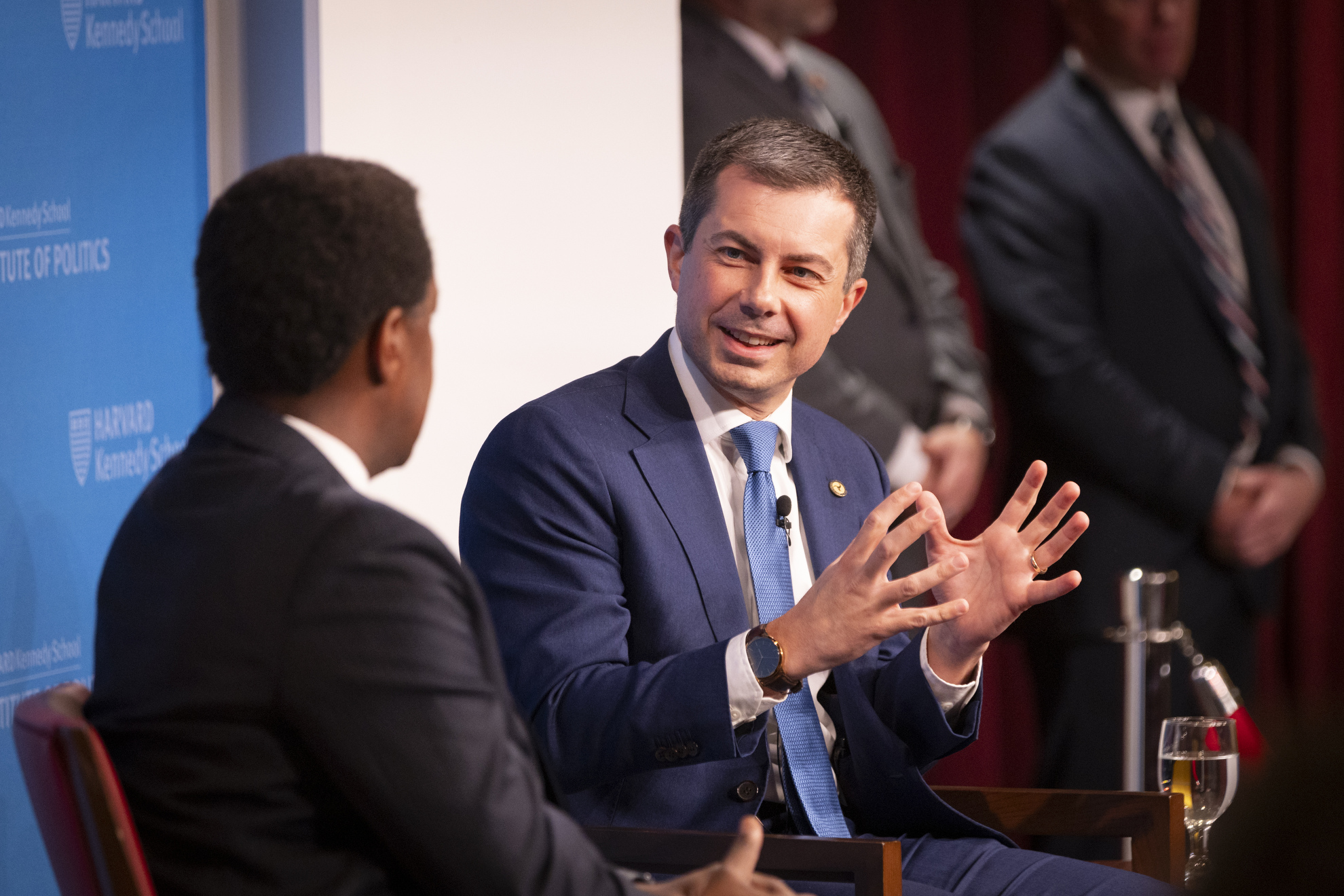The deeply divided U.S. is like “two people locked in a wrestling match on the edge of a cliff,” said Secretary of Transportation Pete Buttigieg at a campus event Monday evening.
“The implicit working theory of our administration has been if we could just deliver on the basics,” such as safe roads and bridges and clean drinking water, “solving some of those basic problems would move our wrestling match a few feet from the edge of the cliff,” he said. “But as everyone has noticed, we don’t seem to be that far from the edge of the cliff.”
He noted that part of the problem for the Biden White House was time. “I would argue that we’ve made enormous progress, basically full employment,” he said. “But so many of the economic benefits that we’ve been working on are things that take years.”
Buttigieg ’04 returned to campus for a Harvard Kennedy School discussion before a capacity crowd with Setti Warren, Institute of Politics director, on his own work at the Department of Transportation, some of the issues awaiting incoming President Donald Trump, and the need for Democrats to focus on advancing priorities through projects on the local and state level that can win wide support.
The transportation secretary said that as he was speaking in his official capacity he would largely avoid talking partisan politics. And he spent much of this time detailing his time in office.
Problems with commercial aviation, he said, loomed large, with issues ranging from a lack of transparency about fees and passenger reimbursements to safety concerns, such as when a section of the fuselage of an Alaska Airlines plane blew out during a flight in January.
In response, Buttigieg said, his department took a holistic response, from a package of consumer protections to a “dashboard” that tracks consumer complaints and airline compliance.
“First we used transparency to supply change, and now we have the letter of the [recently passed aviation] law” while also stepping up enforcement, he said, citing such regulations as new ones that make refunds automatic when flights are canceled (without alternatives being offered) or unduly delayed (three hours for a domestic flight, six hours for an international flight).
“We’re doing these things not against the airlines, but because we need them to deliver better service,” he said.
Ongoing issues include equal access for those with disabilities, he said, noting how some of those passengers say they dehydrate themselves because they know they will not be able to access airplane restrooms. Road safety, as well, remains a concern.
“We lose more than 100 people a day on our roadways,” he said. Comparing this statistic to the safety of air travel, with all its shortcomings, he concluded: “We should be able to do better with forms of transportation on the surface.”
Such basic concerns were the goals of the Biden administration, he said. Acknowledging issues with inflation even as the economy enjoyed robust employment, he explained that focusing on infrastructure improvements was viewed as a possible way to ease the country’s divisiveness.
Looking back on the past four years, the secretary noted the long-term nature of the majority of the Biden administration’s projects and how those have set up the Trump administration for its next moves.
Trying “not to sound bitter,” he pointed out that the incoming administration “will inherit a lot of groundwork that has been laid, jobs that were always expected to come online in 2026 and ’27.” This could provide the basis for a boom, he said.
“The building trades have a pipeline of work that they haven’t seen since before I was born,” said the 42-year-old, who also cited “interest rates ticking down.”
However, he added, the new administration may also create its own challenges. For example, he said, “if something disrupts our supply chains, such as mass deportations,” Americans may once again have to worry about the economy.
Looking ahead, Buttigieg saw common ground in “local voices.” “We’re doing 63,000 local projects,” he said, citing projects that came to the administration “because a state or a city or a tribe … wanted to get something done.”
He stressed the potential for Democrats to muster bipartisan support for such projects. “Principled conservatism has some regard for the local — if anything more regard than the left,” said the former mayor of South Bend, Indiana. “I am hopeful that that principle will survive.
“In moments like this our salvation will come from the local and the state level. A lot of the answers are going to come from mayors, from communities, from states.”
Source link

